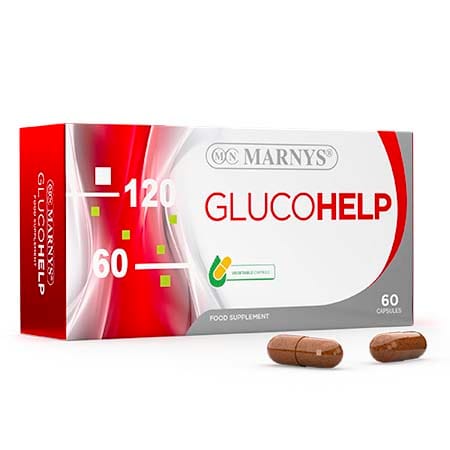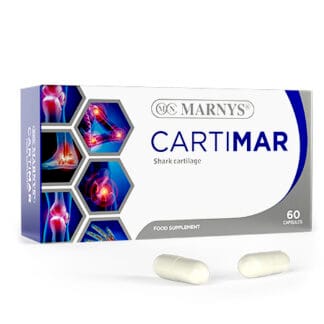Description
MARNYS® Glucohelp is a food supplement with chromium and cinnamon that contribute to maintaining normal blood glucose levels. Supplemented with β-carotenes, and vitamin C and E.
MARNYS® Glucohelp has been developed to help with blood glucose thanks to the properties of its natural ingredients:
- Chromium, which contributes to maintenance of normal blood glucose levels (EFSAEFSA). Chromium is an essential mineral that is not produced by the body and must be obtained from the diet. The best sources are: brewer's yeast, meat, liver, eggs, wheat germ, green peppers, or apples, among others.
- Cinnamon (Cinnamomum cassia variety), with a polyphenol and chromium content of 20%, contributes to maintenance of normal blood sugar levels (EFSA ON HOLD 2013, 3323). Cassia Cinnamon, called in Chinese ròu-gùi, is one of the 50 fundamental herbs used in traditional Chinese herbology and whose branches and bark are used.
- Vitamins C and E contribute to protection of cell from oxidative damage (EFSA).
- β-carotenes which are equivalent to 100% of the NRV (nutrient reference value) of vitamin A. They are pigments found in plants, for example carrots, and are excellent precursor sources of vitamin A.
MARNYS® Glucohelp is a supplement suitable for vegans. It is recommended for adults who want to maintain normal blood glucose levels. Besides, they can benefit from antioxidant protection.

BLOOD GLUCOSE

ASSURED QUALITY
To Know More
What is diabetes?
Diabetes is a group of diseases characterised by a high level of glucose in blood, resulting from defects in the body’s capability to produce or use insulin. Normal blood glucose levels should not exceed 100 mg/dl under fasting conditions, and 140 mg/dl two hours after having a meal.
Obesity, high cholesterol levels, high blood pressure and sedentary lifestyle are some of the risk factors for diabetics. Changes in lifestyle, weight control, physical activity, and healthy nutrition habits are essential for people with diabetes to maintain quality of life and longevity.
What are the types of diabetes?
There are two major types of diabetes:
Type 1 or insulin-dependent diabetes: the body stops producing insulin, a hormone that allows the body to use glucose found in food as an energy source. It usually develops in children or young adults, but can occur at any age.
Type 2 or non-insulin-dependent diabetes: this occurs when the body does not produce enough insulin and/or cannot use insulin properly (insulin resistance). This type of diabetes usually occurs in people over 40 years old, with overweight and family history of diabetes.
How do I know if I’m diabetic?
It is always important to seek the advice of a doctor if you think you have got any of these signs: being very thirsty, frequent urination, weight loss, increased hunger, feeling of pins and needles or numbness in your hands or feet, extreme and inexplicable fatigue, among others.
How to manage your diabetes or blood sugar
Diabetic people should be examined by a physician who will recommend a diet, as well as physical activity. It is important to have got an adequate weight control, since overweight or obesity are factors leading to diabetes or make it difficult to control. Regular follow-ups of the eyes and feet should be carried out to detect any condition in time. In addition, diabetic people need to learn how to control their glucose on a daily basis, what will help determine how well their diet, activity plan and treatment are working to keep blood glucose levels within a normal range.
References
1. Anderson et al. J Agric Food Chem. 2004. Ver artículo
2. Jarvill-Taylor et al. J Am Coll Nutr. 2001 Ver artículo original.
3. Anderson. Proc Nutr Soc. 2008 Ver artículo original
4. Broadhurst et al. Diabetes Technol Ther. 2006Clinical studies on chromium picolinate supplementation--a review.
5. Ellulu et al. Effect of vitamin C on inflammation and metabolic markers in hypertensive and/or diabetic obese adults: a randomized controlled trial. Drug Des Devel Ther. 2015
6. Ylönen et al. Dietary intakes and plasma concentrations of carotenoids and tocopherols in relation to glucose metabolism in subjects at high risk of type 2 diabetes: the Botnia Dietary Study. Am J Clin Nutr. 2003











Reviews
There are no reviews yet.